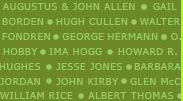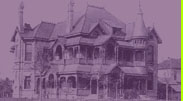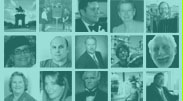WHO'S WHO - KENNETH L. LAY
 (1942-2006)
(1942-2006)
The late Kenneth L. Lay, who to this very day is still remembered as a controversial figure in Houston's history, entered the energy industry as an economist in 1965 because, he said, "I found it a lot more fascinating than other industries."
The only chairman and CEO Houston-based Enron Corp. had ever had, Lay almost immediately brought late 20th-century marketing techniques to the newly deregulated natural-gas industry and planned to do the same thing with electricity.
Lay and Enron were major proponents of retail electricity deregulation, which was approved in seven states, though the Texas Legislature tabled it until 1999. Lay took advantage of gas deregulation to make Enron the nationís biggest and most profitable buyer and seller of gas. Enron developed a wholesale electricity business, which was deregulated in 1994.
To a large extent, Layís training as an economist allowed Enron to answer the knock of deregulatory opportunity. He said, "My training in economics has helped me to predict how markets might react as we went from a heavily regulated industry to a deregulated industry."
It also doesnít hurt that Lay knew his way around government bureaucracy. While in the Navy he was assigned to the Pentagon to develop a modern accounting system for military purchases. He then spent two years as a deputy under the Secretary of the Interior for energy matters. Those jobs taught him the inside story of the deregulation process, as well as the value of political friends. He was chairman of the host committee for the 1992 Republican National Convention in Houston and counts Democrats and Republicans alike among his friends and associates.
After leaving Washington, Lay learned the monopoly utility perspective by serving as vice president for corporate development, then president, of Florida Gas. He became president and COO of Transco Energy in 1981 and CEO of Houston Natural Gas in 1984, the year before it merged with InterNorth Inc., to create Enron.
Enron president Jeffrey K. Skilling said that Lay started a new industry by minimizing risk through the pooling of several long-and short-term contracts. That eliminated the chances of being caught short on the supply side and minimized the risk that comes with rapid fluctuations of natural gas prices.
"We created a lot of new skills and new resources, which in fact helped develop the deregulated natural gas market, with new products and services in risk management, finance, and long-term contracts. Our people are now applying those same approaches to the energy market. Just like natural gas, weíll see a lot of innovation," Lay said.
Lay served as a member of the Presidentís Council on Sustainable Development. He also served as chairman of the Greater Houston Partnership and the University of Houston Board of Regents. Lay was co-chairman of the 1990 Economic Summit Host Committee and served on the board of the H. John Heinz III Center for Science, Economics, and the Environment.
"The winners are usually the ones that get their restructuring done early," Lay said. "We kind of like to try to jump over the valley then slide down in the valley so we can become leaders in the deregulated industry."
In 2001, questions about Enron's bookkeeping surfaced and Lay departed from the company he created by early 2002. He was later charged by federal prosecutors from the Justice Department's Enron Task Force, but he still continued to defend both himself and Enron in a numerous interviews and public forums.
"I firmly believe I'm innocent of the charges against me,'' Lay said outside a Houston courthouse moments after receiving a litany of guilty verdicts and maximum penalties that added up to a combined 165 years in prison. "We believe God is in fact in control and indeed he does work all things for good for those who love the Lord."
Just weeks after he was convicted on May 25, 2006 of defrauding investors and employees in the Enron scandal and before final sentencing he in died, July 5, 2006, in Colorado of coronary artery disease. He was 64.






